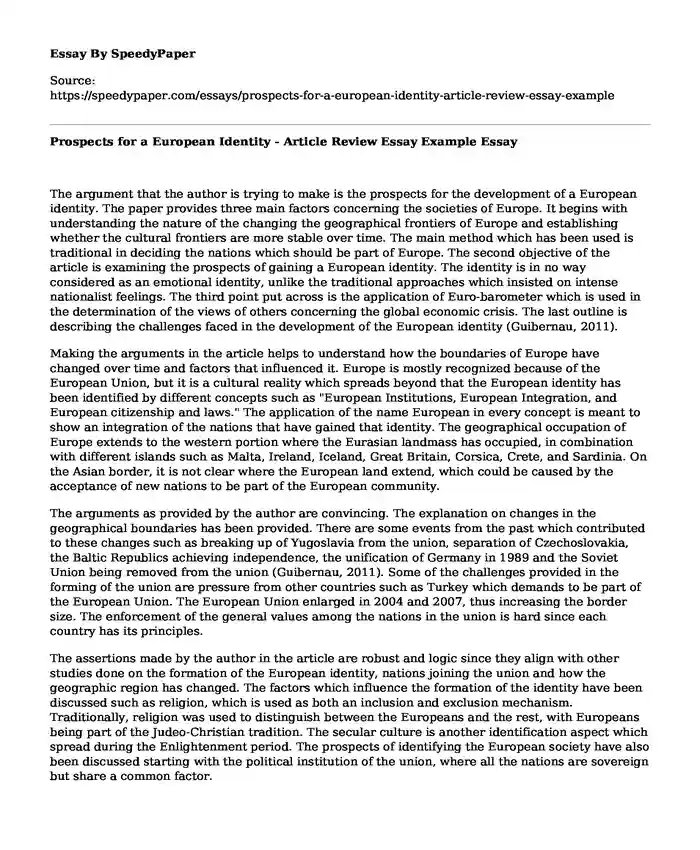The argument that the author is trying to make is the prospects for the development of a European identity. The paper provides three main factors concerning the societies of Europe. It begins with understanding the nature of the changing the geographical frontiers of Europe and establishing whether the cultural frontiers are more stable over time. The main method which has been used is traditional in deciding the nations which should be part of Europe. The second objective of the article is examining the prospects of gaining a European identity. The identity is in no way considered as an emotional identity, unlike the traditional approaches which insisted on intense nationalist feelings. The third point put across is the application of Euro-barometer which is used in the determination of the views of others concerning the global economic crisis. The last outline is describing the challenges faced in the development of the European identity (Guibernau, 2011).
Making the arguments in the article helps to understand how the boundaries of Europe have changed over time and factors that influenced it. Europe is mostly recognized because of the European Union, but it is a cultural reality which spreads beyond that the European identity has been identified by different concepts such as "European Institutions, European Integration, and European citizenship and laws." The application of the name European in every concept is meant to show an integration of the nations that have gained that identity. The geographical occupation of Europe extends to the western portion where the Eurasian landmass has occupied, in combination with different islands such as Malta, Ireland, Iceland, Great Britain, Corsica, Crete, and Sardinia. On the Asian border, it is not clear where the European land extend, which could be caused by the acceptance of new nations to be part of the European community.
The arguments as provided by the author are convincing. The explanation on changes in the geographical boundaries has been provided. There are some events from the past which contributed to these changes such as breaking up of Yugoslavia from the union, separation of Czechoslovakia, the Baltic Republics achieving independence, the unification of Germany in 1989 and the Soviet Union being removed from the union (Guibernau, 2011). Some of the challenges provided in the forming of the union are pressure from other countries such as Turkey which demands to be part of the European Union. The European Union enlarged in 2004 and 2007, thus increasing the border size. The enforcement of the general values among the nations in the union is hard since each country has its principles.
The assertions made by the author in the article are robust and logic since they align with other studies done on the formation of the European identity, nations joining the union and how the geographic region has changed. The factors which influence the formation of the identity have been discussed such as religion, which is used as both an inclusion and exclusion mechanism. Traditionally, religion was used to distinguish between the Europeans and the rest, with Europeans being part of the Judeo-Christian tradition. The secular culture is another identification aspect which spread during the Enlightenment period. The prospects of identifying the European society have also been discussed starting with the political institution of the union, where all the nations are sovereign but share a common factor.
Appropriate evidence has been applied in the study to support the ideas and arguments put across. The characteristics of the European Identity have been described in the article beginning with the prospects of the European Identification (Guibernau, 2011). The union is identified as a political institution which has experienced growth in territory aspects and the number of citizens. The region has also grown in the aspects of productivity, international presence and wealth. Devolution policies are guiding the union, and it causes disagreements within the countries since they are sovereign. The countries are involved in funding to help member nations when they are in need. The union being a non-emotional identity is meant to ensure that nations do not use self-interests in when making a decision involving others.
Throughout the article, Guibernau (2011) has supported his ideas and arguments with explanations and reasoning for why various things have been taking place. The way everything is outlined from the formation of the European Identity to the challenges facing the union is explained. The prospects of the union have been described, to guide the political institution. Despite having values which guide the union, it is hard to implement them, thus resulting in the different challenges as indicated.
In conclusion, the European Union is presented as a dynamic political institution which is trying to develop an identity. Changes seen mostly have been on the geographical occupation, with countries being included and other excluded depending on various factors such as religious affiliation. The countries which belong to the union have various benefits such as getting financial support when in need. They also benefit from the free trade and international relations connecting the members of the European Union.
Reference
Guibernau, M. Prospects for a European Identity. Int J Polit Cult Soc, Vol 24, 2011 pp. 31- 43.
Cite this page
Prospects for a European Identity - Article Review Essay Example. (2022, Jul 25). Retrieved from https://speedypaper.com/essays/prospects-for-a-european-identity-article-review-essay-example
Request Removal
If you are the original author of this essay and no longer wish to have it published on the SpeedyPaper website, please click below to request its removal:
- Lern More on Participative Leadership Theory in Free Essay
- Free Essay in Social Work: Dual Relationships
- Free Essay on Reduction of Air Pollution Using Bio Fuels as Form of Renewable Energy
- Essay Example on Miscarriage
- Essay Example on Population-Ecology, Critical, and Postmodernism Theories
- Karl Marx and Capitalism, Free Essay for Everyone
- Essay Sample on New Approach to Renewable Energy in Urban Areas
Popular categories





